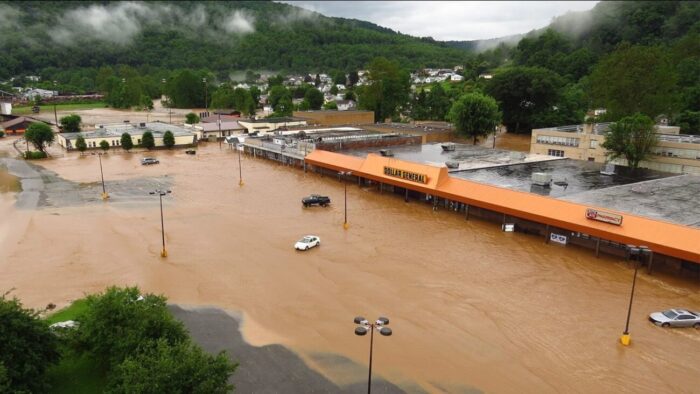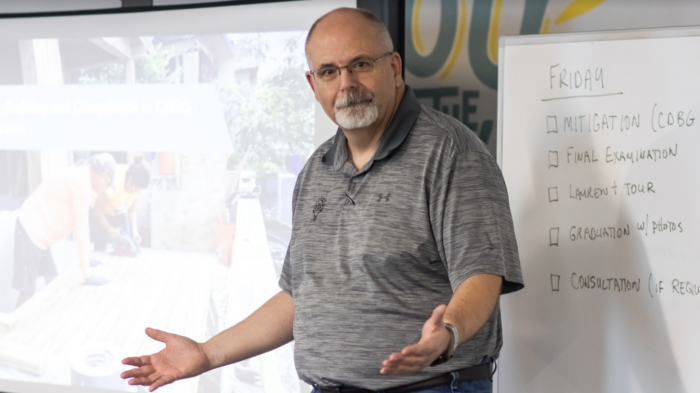Within the span of 12 hours, 8–10 inches of rain fell in parts of West Virginia in June 2016, resulting in flash flooding throughout the state. It was historic, a one-in-a-thousand-year event.
It was also devastating: 23 people died, more than 5,000 homes were damaged and there was more than $36 million in damage to roads and bridges across the state.

President Obama declared a Federal Disaster, enabling FEMA to provide immediate individual assistance to West Virginians. Subsequently, HUD provided the state with a substantial Community Development Block Grant for Disaster Recovery (CDBG-DR), which financed a focused recovery on a variety of disaster recovery programs, including repair and replacement of disaster-damaged homes, bridge repair, rental assistance, slum and blight removal, and multi-family building programs.
Michelle Peneloza joined the West Virginia Development Office as the CDBG-DR program manager in 2018. By the time she traveled to New Orleans for one of our Leadership Practitioner Courses, she was feeling defeated. The housing program just had its best quarter yet but only completed 13 homes. Two years into the grant, WV had 400-some homes to go.
CDBG-DR grants are multifaceted and are guided by significant amounts of complex federal regulation and constraints. They must be spent within six years and grantees must comply with all federal regulation. The process and timeline can be intimidating even for the most experienced public administrators.
In order to get all of WV applicants completed, the WV team would have to complete 33 homes for every single quarter for the rest of the grant. It seemed impossible.
At their current performance rate they could get 156 homes done, which meant leaving out more than half of their applicants. That idea was devastating for Michelle and her invested team for the recovery.

JR Sanderson leads SBP’s Leadership Practitioner Course from a place of profound experience. He designed and led the highly successful South Carolina Disaster Recovery Office in the aftermath of Hurricane Joaquin in 2015 and Hurricane Matthew in 2016. He also conducted the planning and developed the strategy for the Hurricane Florence recovery in 2018, including the management of the $157M CDBG-Mitigation grant. South Carolina’s disaster recovery efforts were record-setting in terms of providing high-quality services to citizens in 22 counties across the state, and in the overall strategy and swiftness of the recovery.
JR has a unique understanding — because he’s been there — of the skill sets needed to manage these large grants that come with complex and nuanced requirements. The Leadership Practitioner Courses (LPCs) teach public administration leadership combined with practical management skills under the auspices of a CDBG-DR and CDBG-MIT grant. Attendees learn methods and practices that can positively influence their program and the majority go on to implement changes based on lessons learned from our material. The course is designed to educate and inform grantees on how to administer more productive and efficient disaster recovery programs.
Michelle is an example of a partner that applied the learnings with strong results. A year after leaving New Orleans, West Virginia’s housing program has gone from completing 13 homes a quarter to 42. They stayed on-target during the pandemic, an impressive feat that resulted in removal from the “Slow Spenders” list determined by HUD.
Part of our success was the cultural change of shrinking the time between disaster and recovery. Your entire team has to believe in the mission to serve applicants first with weekly goals set for each team member. Before, we were putting out so many fires we didn’t have time to think about what our goals had to be. With the end in mind, we defined our standards that had to be met and measured accomplishments instead of effort. If you break down your goals for a week or a month, you can figure out what you need to do. It’s much more manageable. ~Michelle Peneloza
Often it is the communities with the most wealth that fare better when applying for funding and assistance after a disaster because they have more resources — they can hire expensive consultants to help with recovery plans and implementations. But thanks to a generous grant from the Walmart Foundation, we’re able to make LPC accessible to all current or prospective CDBG-DR and CDBG-MIT grantees. We’re able to reimburse travel expenses, pay for lodging, all course material and the course itself. This means that every community has access to the information and training that can greatly improve outcomes for their citizens.
Our next course will be in-person at SBP Headquarters in New Orleans, July 13–15, 2021. Email us at advise@sbpusa.org for more information about joining.

